#Welsh devolution
Explore tagged Tumblr posts
Text
New Labour’s Constitutional Reforms
New Labour’s Constitutional Reforms and how they have destroyed the United Kingdom's Constitution and ended the UK's political union.
The Labour Party is a political party created on 27 November 1900 a centre-left party in the United Kingdom. There has been a governing party that is a ruling party of this country since it went into coalition twice during the 1920s and finally won power in the 1945 general election. The New Labour Party, or New Labour Project, aimed to attempt in the 1990s to revitalise the ability to win…

View On WordPress
#Alfred the Great#Athelstan#King Offa of Mercia#New Labour Party#Scottish devolution#Tony Blair#Welsh devolution
2 notes
·
View notes
Text
Welsh Gothic in Film: DARKLANDS (1996)
This is a mini-essay/thought-dump I had in my August newsletter after watching DARKLANDS (1996). It links back to my posts on Jane Aaron’s Welsh Gothic (UWP, 2013), so I thought I would post it again here. CW: rape scene discussed Pre-Devolution Horror I’ve been doing the #100HorrorMoviesin92Days challenge and keeping my thread updated on Mastodon, TwiX and Bluesky. My latest watch…

View On WordPress
3 notes
·
View notes
Text
This is a very rambly post!! I am just having a lot of thoughts. I am not here to demonstrate astute scholarly analyses!
I am thinking about the strike of 1984-85.
I am thinking about the collaboration between the LGBT+ community and miners, the involvement of women in the production of tapestries that displayed socialist slogans* as well as their organisation of disseminating food and care, the unity between and within communities throughout that year, the terrible human and material toll and its impact on women and children, the motives of thousands of men young and old and many of whom had come from generations of men who had worked in the mines before them. They were defending not merely livelihoods but the concept of a people, an identity, and a voice in a political landscape that abhorred trade unions and downplayed workers’ voices whilst deeming coal to be ‘uneconomic’ and pushing foreclosure of the Pits with no regard for just what the industry meant across Britain and most significantly in Wales. Obviously the strike was not isolated to Wales, but the significance of the strike, and its legacy, in shaping Wales into what it is today cannot be overstated. In fact, it paved the way for Devolution.
I’m thinking about the violence wrought upon these communities by enforcement, though not all policemen were hostile to the strikes and in fact some sympathised. I am thinking about the divisions within communities as the strains of the strike wore on; men who returned to work to provide for their families after months of no heating, scarce food, and no money to pay the bills, who were decried as ‘scabs’ for betraying their fellows. I think about this partly because the sheer force behind the strike was to such a degree that close-knit communities and peoples saw it as necessary conduct; an obligation to your people for the sake of livelihoods and heritage, yet its importance fractured families and friendships. I am thinking about all of the men who were laid off or arrested and beaten mercilessly and senselessly, and who lost their lives.
*One example of a slogan that featured frequently on banners was, ‘Forward to socialism!’ However, interestingly, there’s also a fascinating evocation of the French Revolution and the Paris Commune on some banners with the slogan ‘liberty, fraternity, equality.’ It shows the intent and sense of community that these people had, as well as their optimism, their ambitions for their voices not simply to be heard but to be listened to.

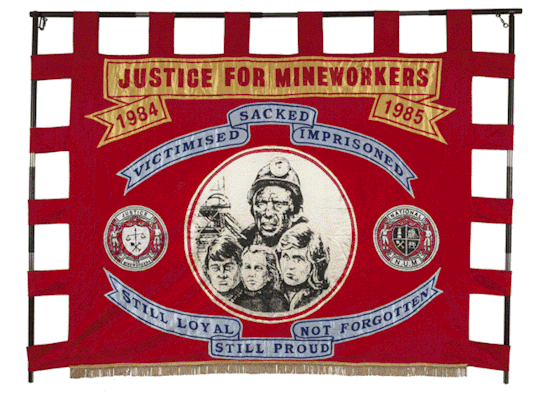



Here are some examples of the banners that I mentioned. I had the absolute privilege of seeing a few in person, and the detail and vibrancy on these works are wonderful. The passion and spirit that fuelled their creations is palpable. Another thing that I find interesting about them was how many of them represented the communities and collieries that were striking because it showed collaboration and compounded the fact that the closures would impact not just the industry but entire communities across Great Britain. And what do we find? It very much did. Many towns are destitute today, many communities erased, histories, and peoples. Peoples! It was young men, aged seventeen who had just joined an apprenticeship, mothers who worried for the futures of their sons and husbands, husbands who worried about whether or not they could pay bills and help to put food on the table. This is why I think about the strike. It was a remarkable expression of a united people’s voice that was silenced but not erased. The legacy of closure endures, but these people and their efforts and their voices are preserved and not forgotten.
As I said at the beginning of the post, this is not a particularly scholarly…thing. I just wanted to ramble a little bit.
Also, shoutout to Bronksi Beat for supporting the miners and their families!
3 notes
·
View notes
Text
Devolution isn't enough if the other nations are punished for England making budget cuts.
Just one of many reasons why we all need independence.
0 notes
Note
What do you think of the idea of English regional devolution? (i.e. Yorkshire, West Midlands, etc. getting autonomous assemblies and First Ministers similarly to Scotland, Wales or N.I)
It is absolutely desperately needed, England needs more regional devolution. Although I think it’s more likely they’d be regional assemblies rather than having the same autonomy as the Scottish or Welsh governments.
86 notes
·
View notes
Note
So what ur thoughts on the bafias nominations David been nomination for best comedy actor while Michael hasn't been nominated for anything and the fan on twitter can't understand why now I personally think after Al aggressive behaviour on a post when they got his name wrong on his favourite radio station and how her stories on ig recently just werid behaviour do u think Al may had sabotaged his chances of getting a nomination for anything
What ur thoughts
Hi there! So I am once again on the road and attending a conference in Las Vegas that just wrapped up, and now I finally have a chance to comment on today's exciting news.
I'm sure everyone has seen by now, but congrats to our lovely David on his first (main) BAFTA nom for Male Performance in a Comedy!

It seems almost surreal that David has never been nominated for a (main) BAFTA before now, and given the breadth of his other recent TV performances (Des, Litvinenko) nominating him for Good Omens season 2 is certainly a choice...especially in the absence of a nomination for Michael. Looking at the list of nominations, it appears that Best Interests was nominated for Limited Drama, as was Sharon Horgan for Leading Actress...but no nomination for Michael for Leading Actor, either. So very quickly, this starts to look like a visible and intentional snub.
In terms of why Michael would be snubbed, I think there are a few possible reasons, but none of them have anything to do with AL. Readers of my blog know that I am never hesitant to call Anna out when it is merited, but in all likelihood the BAFTA nominations were decided long before now, and in my opinion she would not have any influence on whether Michael is nominated regardless of when her social media posts were made. So it does not make sense to place blame on her in this instance.
My feeling is that the reasons for Michael's lack of a nomination (and really, David's nomination specifically for GO) are likely twofold. One is that I'm guessing Amazon/whoever submitted David for consideration didn't want to pit Michael and David against each other. If they were both competing in the same category, it could split the votes, so only nominating one of them seems the best way of avoiding that. The second reason (again, in my opinion) seems to be political.
I was surprised to recently learn that Prince William is the president of BAFTA--British followers, help me out here, because this is very, very weird to a confused American--and as we know, Michael has spoken out on a number of hot button issues over the last few months: Opening a conversation about Welsh independence. The question of the devolution of the crown estate to Wales. And of course, abolishing the title of Prince of Wales. Not to mention all of the backlash incurred by the release of The Way, which was roundly savaged in the press and accused of promoting anti-English sentiments.
Granted, there have been politically active nominees and winners at the BAFTAs in the past, but it really feels like the combination of all these things is somehow working against Michael. Let's also not forget this epic picture from the BAFTA film awards last month, with Michael giving Wills the side-eyest of Welsh side-eyes:
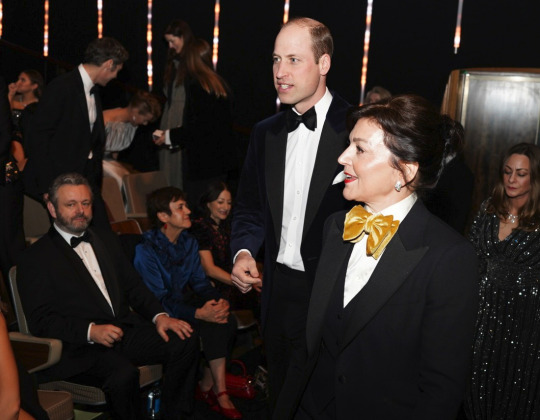
All this said, it is difficult (if not impossible) to think of Michael and David's performances in GO as separate things, because they are so inextricably intertwined. The reason that we got David's incredible performance as Crowley is because Michael was there as Aziraphale, and vice-versa. I think David and Michael themselves would be the first ones to say it, as well as to be in awe and so supportive of each other's acting. The response of fans to this nomination news--saying Michael is a better actor, Michael deserved to be nominated instead, etc.--is so perplexing to me, because I think he was probably the first one in line to congratulate David, and would chew out anybody who put down David's acting for any reason.
I also think that if the lack of a nomination is due to the above-mentioned political reasons, then Michael is probably wearing it like a fucking badge of honor. I think he is also happier for David than anyone else on the planet right now (because that's his boyfriend, damn it), and I truly hope the stars align and give us Michael presenting David with an award again like at the NTAs in 2021. (Michael subsequently carrying David off the stage bridal style would be the cherry on top of the already extremely homoerotic cake.)
I also feel that there is no question David is as taken aback by his nomination/Michael's lack of a nomination for GO as much as the rest of us are. While I have no idea what David's chances of winning truly are, I think he would wholeheartedly and enthusiastically share that award with Michael. And I think he will share that night with Michael no matter what, regardless of what happens on the broadcast.
So many possibilities come to mind, really. I can imagine David and Michael re-enacting Every (without the heartbreaking bits, of course) on stage. I've seen people making references to the infamous Slow Show fic/how it parallels to real life, and while I've only read part of it (haven't gotten to finish), the thought of any kiss between Michael and David is beyond gorgeous to contemplate. Not for the sake of "content" or as a joke, of course (because I don't think they would be willing to kiss as a joke, because if they were, they would've done it by now), but because we would see a facet to Michael and David's relationship that's always been there in private become public. And it would be their choice to share it with us.
Those are my reactions to the BAFTAs announcement today. I'd love to hear from my followers as well with your thoughts and comments. Thanks for writing in! x
#angel19924#reply post#michael sheen#welsh seduction machine#david tennant#soft scottish hipster gigolo#good omens 2#BAFTAs 2024#someone please explain to me why being a Royal means William somehow knows anything about the arts or movies or TV#because i am befuddled#also i like to think Michael came running over to David's once the nominations were announced#after which an hour-long snogging and cuddling session commenced#and they were neighbors#there is no Crowley without Aziraphale#or vice versa#and I think Michael and David both know that#but love each other too much to hold grudges#ineffable lovers#thoughts#discourse
63 notes
·
View notes
Text
Okay, okay. Last one for today, I promise! Before I go to bed, have some further thoughts about the British Isles bros in my Hetalia National Animals AU:
England: rabbit → lion
Yep, Arthur was a twitchy-nosed bun when he was young. Something I bet he finds very embarrassing even to this day, hehe. Neither species is native to Britain, interestingly enough. Lions are obvious but people think rabbits have always been here. When in fact they were brought over by the Romans as a food source to support their invasion. The more you know. 💫 I picture Arthur as ever feeling a bit of an outsider in his family (the lone anglo amongst celts) and it fits with this interpretation. His older bros all have either native or domestic creatures for their animal forms. And then there’s Arthur: sticking out like a sore thumb with England’s giant, fuck off, big cat, lol. He became a lion sometime after William the Conqueror took over England. The golden English lion the world is familiar with is actually the emblem of Normandy; the French Duchy William originated from.
Scotland: stag
A heck of a lot of Scottish heraldry uses deer and, since I’m enforcing a self-imposed ban on mythical animals in this AU, a stag makes a good stand-in for the Scottish unicorn. Alasdair was the only brother who scored some real, lasting victories against Arthur back in the day. As evidenced by Scotland keeping its independence and then joining the UK as a kinda, sorta equal partner rather than being dragged in against its will. So Alasdair would need to be a big, powerful beast that could toss a lion on its horns on a good day. So yeah, a stag is good for him.
Wales: ??? → ??? → dog
Wales is the brother giving me the most trouble. For starters, I feel like he should have had a different form back in the old days. Like Arthur’s rabbit, but IDK what it should be? Then I wonder if he should have spent time as a lion alongside Arthur. Wales was conquered to the extent that it was considered fully part of England for hundreds of years. That’s why the Welsh flag doesn’t get its own part of the Union Jack like the other home nations, don’tcha know. Wales as a reddish furred lion alongside Arthur’s gold would be pretty cool, ngl. But then Wales did manage to preserve its national identity in spite of everything. So I’m not sure a full transformation is appropriate in his case. Even if it would get reversed later when Wales regained its status as a country through devolution. The only thing I am sure of is that his true beast form would be a dog. Something clever and tough that can herd and guard with care, but is equally able to rip apart a predator without mercy. Maybe some kind of sighthound like in the legend of Gelert.
Ireland: grey wolf → Irish wolfhound → ???
Speaking of doges with sad backstories! Ireland would have remained a wolf until he was conquered and became a part of the United Kingdom. Even before that happened there was this whole thing about eradicating Ireland’s wolves. Which I believe was spearheaded by the ruling English lords? My history lessons on this were ages ago so feel free to correct me if I’m wrong. There was definitely a drive to tame and “civilise” what the English saw as a savage and wild land, I know that much. So a wolf-to-dog forced transformation is as much appropriate as it would be unwanted by the one enduring it. Definitely a lot of trauma there, methinks. Would Ireland turn back into a wolf after his people left the union and he became a republic? Mmmaybe…? I don’t know. Ireland was forever changed by its inability to resist the British invasion. A lot of its native culture was lost or replaced as a result. And a dog being so close to a wolf anyway could make changing back even harder. Mmm yeah, IDK. Leaving it ambiguous might be appropriate in itself.
Northern Ireland: grey wolf → Irish wolfhound
Eeyup, same beasts for the Ireland twins. Their attitudes towards the changes they’ve gone through would be very different, though. If it’s ambiguous whether or not Ireland is turning back to a true wolf, North definitely isn’t. If Hima had kept the UK bros’ story closer to real history then North would never have been a wolf at all. Starting life as a hound right from the beginning instead. But he didn’t, and so we got the slightly confusing scenario of both twins already existing long before partition put Northern Ireland on track to becoming a distinct nation. Ah well, what ya gonna do. Hima moves in mysterious ways.
#hetalia#hws england#hws scotland#hws wales#hws ireland#hws northern ireland#aph england#aph scotland#aph wales#aph ireland#aph northern ireland#national animals au#my posts
22 notes
·
View notes
Text
Campaign to devolve the Crown Estate to Wales launched
Siarter Cartrefi, in partnership with Beth Winter MP and Liz Saville Roberts MP, will be holding an open meeting, with the support of Michael Sheen, to launch a new campaign focused on devolving the Crown Estate to Wales.
Beth Winter and Liz Saville Roberts will give an update on the Cross Party Bill in Parliament to Devolve the Crown Rights and a short video message of support from Michael Sheen will be screened, before opening up to a discussion on the future of the campaign. The meeting will take place online on 30 January at 7pm.
This event aims to pull together individuals and organisations in a sustained joint campaign that will demand the devolution of the Crown Estate with the profits directed into a Sovereign Wealth Fund, managed by the Welsh Government, for community benefit.
Siarter Cartrefi, the Welsh Housing Justice Charter, is a grassroots organisation that brings together community activists from across Wales, collaborating with third sector, campaign organisations, Welsh Government and others.
In the spring of last year, Siarter Cartrefi co-produced Ten Recommendations to the Welsh Government via a community consultation and Emergency Housing Conference, devolving the Crown Estate was one of them, and was seen as a way to secure a more sustainable future for Welsh communities.
The Crown Estate is a collection of land and assets owned by the Crown, but managed by an independent trust. Its profits are funnelled into the UK Treasury, and 25% of revenues into the Sovereign grant, paid for the upkeep of the royal family.
The Crown Estate in Wales owns about 65% of the Welsh foreshore and riverbed, and more than 50,000 acres of land. In 2020-21, the value of the estate went from £96.8m to £603m, reflecting the value of the land for renewable development and other projects.
The estimated annual revenue in 2020-2021 was £8.7m. As revealed by Cymru Republic, the value in 2023 is £853m.
Since 2016, the Crown Estate has been devolved in Scotland.
Catrin O Neill, founding member of Siarter Cartrefi said: “Devolution of the Crown Estate is a key recommendation from our community consultation work. The people of Wales increasingly see this as a really important cause.
“In the coming weeks we will be working with other campaigners to build momentum behind this fundamental issue. Wales should benefit directly from the profits of renewable energy, and to use this money to address the poverty and inequality in communities across Wales.”
Dylan Lewis Rowlands, member of Siarter Cartrefi said: “Our work on housing in Wales proved that, as the title of our report states, Housing is not just about Housing.
“Housing is a fundamental bedrock of communities, but there are so many inter-related issues that we could not ignore them. We are working on this campaign as a natural next step of our work, and we must win it, for the future of our communities in Wales”
The meeting will take place online, on 30 January at 7pm. Join via the Eventbrite link here.
59 notes
·
View notes
Note
The Prince of Wales should’ve been at the celebration for the 25th anniversary of the Welsh devolution. It’s annoying to see his elderly father who is undergoing cancer treatment (and looks visibly unwell) to go instead. I wonder if Buckingham Palace is pissed off?
He should have but I do have to wonder if this was a situation where Charles wanted the attention all to himself. Maybe he did want William there, but knowing Charles, it's entirely possible that William wasn't invited.
11 notes
·
View notes
Text
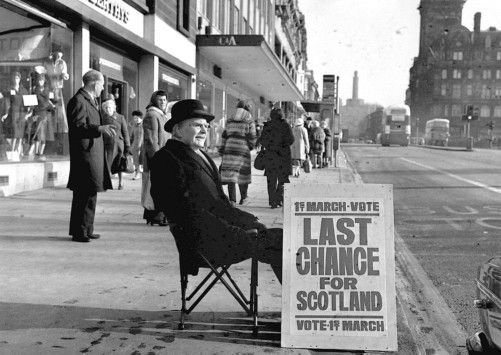
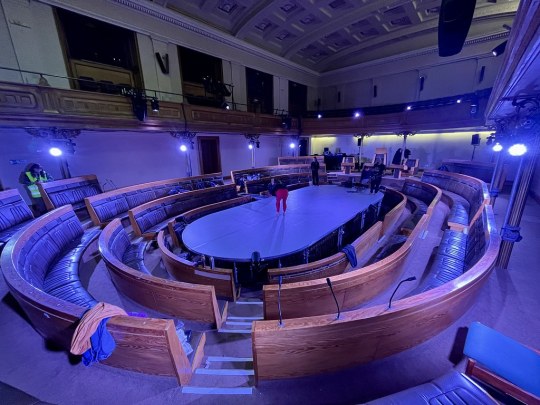
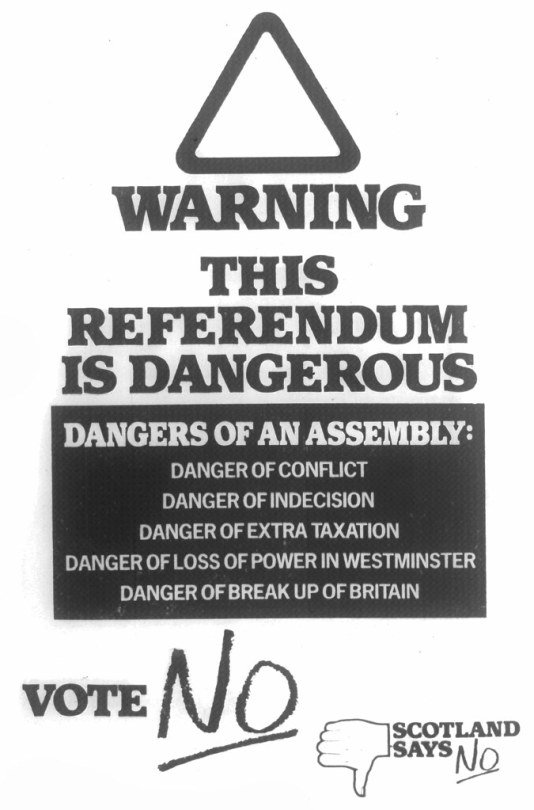
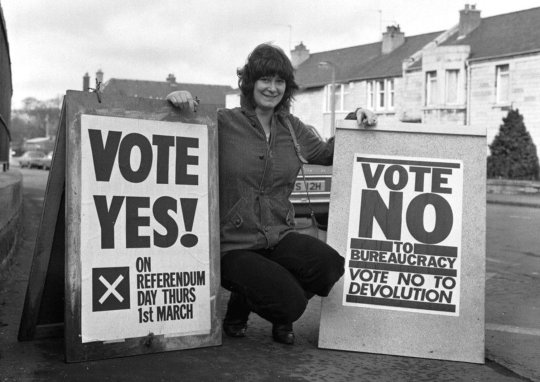
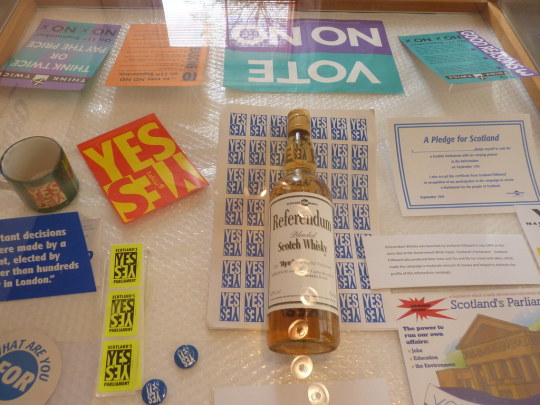
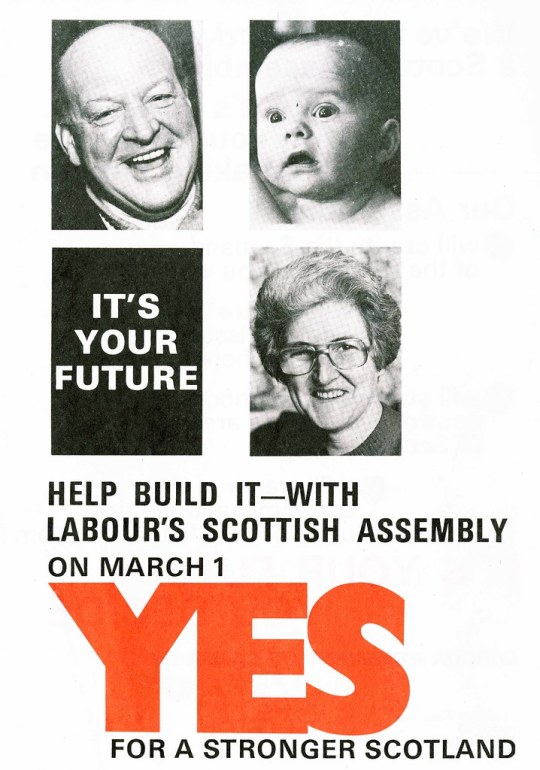
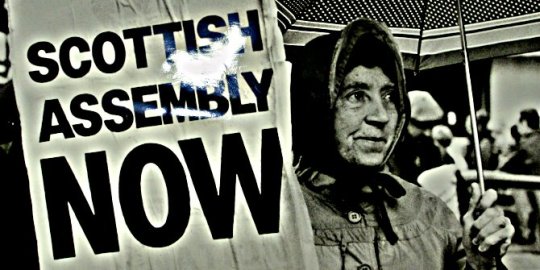
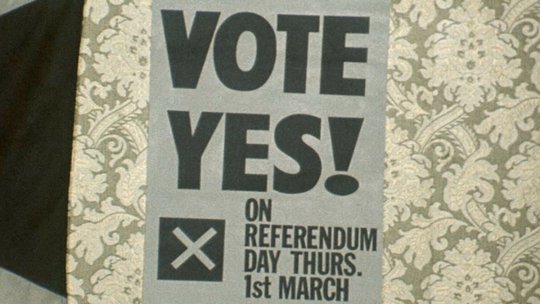
On March 1st 1979 Scots voted in favour of Devolution, but failed to reach the required 40% of the population in favour of implementing it - due to 36% of the electorate not voting.
THE PLOT.
The introduction of devolution legislation in 1976 was largely the product of nationalist pressures on the Government. James Callaghan's Labour government had a majority of only three after the 1974 (October) election and by 1977 had no majority at all after a series of by-election defeats. The government was therefore vulnerable to pressures from the Scottish National Party and Plaid Cymru, who between them won 14 seats at the election (SNP 11, Plaid Cymru 3). The Kilbrandon commission had reported in 1974, recommending the establishment of a Scottish parliament and endorsing the principle of devolution.
A combined Scotland and Wales Bill was introduced in November 1976. It gained a second reading only after referendums in both Scotland and Wales had been conceded. The Shadow Secretary of State for Scotland, Alick Buchanan-Smith, and one of his front benchers, Malcolm Rifkind, resigned their posts when the Shadow Cabinet decided to oppose its second reading. On the first day of committee 350 amendments were put down. Michael Foot, (then Lord President and Cabinet Minister responsible for the devolution bill) was reluctant to impose a guillotine. After nearly 100 hours of debate only three and a half clauses of the bill had been considered. A guillotine motion was tabled but defeated in February 1977. The Bill was withdrawn.
In November 1977 separate Bills for Scotland and Wales were introduced, with support from the Liberals. This reduced opposition from those who had previously opposed the combined Bill on the grounds that the Welsh did not really want devolution. This time the guillotine motion was won.
As the committee stage was nearing its end, it scrutinised an amendment from Labour backbencher George Cunningham. It required the Secretary of State to lay before Parliament an order repealing the Act unless at least 40% of the eligible electorate voted "yes". The amendment was strongly opposed by the Government, but they lost the vote by 166 votes to 151.
In the referendum, on 1st March 1979, Scotland voted in favour of devolution by 52% to 48% - but only 32.9% of the electorate had joined the majority. In Wales the vote was against devolution, by 80% to 20%. The Acts were repealed the next month.
The Government was not helped by the extent of internal dissent within the Labour party. There was an active Labour 'Vote No' campaign in Scotland, of which Brian Wilson was Chairman, and Robin Cook a Vice-Chairman together with Tam Dalyell.
In Wales, Neil Kinnock was among those who campaigned for a "no" vote. During the last few days of the campaign in Wales, the pro-devolution Labour party -TUC group argued that a "No" vote would be a vote for the Tories, and a vote against the Government. This was a gamble that did not pay off; the scale of the "No" victory meant that those who had campaigned against the government could feel vindicated.
A motion of no confidence in the government was tabled by the Conservatives and supported by the SNP, the Liberals and eight Ulster Unionists. This motion was carried by one vote on 28th March 1979. The next day Callaghan announced that Parliament would be dissolved.
The 1979 Results:
Scotland: Question: Do you want the provisions of the Scotland Act 1978 to be put into effect ?
Yes 1,230,937 (51.6%)
No 1,153, 502 (48.4%)
Rejected ballot papers 3,133
Electorate 3, 747,112
Turnout 63.6%
But, we Scots are known the world over for this saying. Try, try and try again we did and won our parliament. We did and we put the party in powder who would take us to freedom. We will never give up our fight to be an Independent country once more.
22 notes
·
View notes
Note
Nah, France invaded us in 1487 to subjugate us and force Anne of Brittany to marry the French king. They subsequently annexed us in the early 16th century and it's all gone to shit from there.
The Welsh get vastly more rights than we do.
That's kind of sad. The Welsh having more rights. They're not that independent from the uk. Especially compared to Scotland and northern Ireland. Is there any sort of serious devolution movement in Brittany?
5 notes
·
View notes
Text
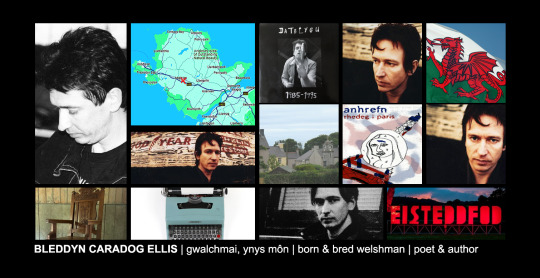
LECHAN YN Y GWAED | welsh (+ welsh descendant) ocs | part one: bleddyn
I think we'll start this little series with my Welshest character: Bleddyn Ellis. He was born and raised in Gwalchmai, which is village that's smack in the middle of nowhere on Ynys Môn, having been born in a farmhouse just outside the village itself. The island, like most of North Western Wales, is a very very low-income, Working-class area - his specific area is very agriculture-heavy because of its very rural location... His mother was a homemaker and part-time laundress, while his father was a quarryman who worked at Dinorwig quarry and would often leave the home for weeks at a time, sending a good portion of his pittance of a wage back to the family on the island via the post. Both his parents were Welsh and spoke very little English, which means he grew up mostly speaking his native language of Welsh at home and with most people he came across while growing up. He didn't learn English until he was in his third year at primary school (around 7/8 years old) and didn't fully gain the ability to code-switch his heavy North Western Welsh accent until he was about 22 and he'd been living in London for four years. He is a very proud Welshman, making a point of saying so whenever he gets the chance -- especially when he's in discussion about his writing work. Though his most popular/famous writing is in English, he does have work published in his native Welsh including a book of poems entitled: Beth Am Yr Ysbryd? (What Of The Spirit?) which is full of poems he wrote about his time living in London and feeling like a fish out of water, and a three separate novels entitled: Hunllef (Nightmare) which is a horror novel, Fasiwn Stâd (lit.: Estate Fashion, contextually: What A State) which is a 'slice of life' novel, and Malu'n Racs (Broken (Into Pieces)) which is a dramedy-romance novel -- he will bring them up whenever an interviewer asks about his first English book and refers to it as his first ever book because it isn't, his first ever published book is BAYY?. Blaidd is a regular competitor at the Eisteddfod, usually submitting his poems and prose by post, and has won a total of 2 chairs. He has mixed feelings about the festival, given that it tends to favour Southern Welsh people and/or people of higher class than Bleddyn is/was growing up (ie: people with a lot of money). He has also recited his Welsh poems at various writing events across the UK (not that they got much praise outside of his homeland). His all-time favourite (Welsh) bands are (Yr) Anrhefn and Datblygu, and he often listens to them for inspiration. He has successfully gotten his non-Welsh friends into both... Mostly by accident. He has made a point of speaking Welsh to his daughter, Begw, in a bid to keep the language alive and to teach her about her heritage. He believes that it's important for her to learn the 'mamiaith' so that she can have easier access to her history, culture, and be able to communicate with family on the Ellis side of her family tree. In doing that, though, he's gotten ire from English parents and he's found his (reluctant) respect for English people slip more in recent years because of how he's been treated for the great sin of speaking to his child in a language that's more natural to him. Bleddyn was alive for a lot of the more recent-memory Welsh history, such as the drowning of Tryweryn, Cymdeithas Yr Iaith protests, the arson attacks on English-owned summer homes in tourist-heavy areas/areas of dire housing crisis due to tourism, and is pro-devolution (or pro-a Welsh Assembly, which is now known as the Senedd/Welsh Government -- something that operates separately from the UK Government in a majority of areas, including (minor) law-making, international relations, health, education, etc. and came to be in September of 1997, Blaidd's story is set between January 1997 and September 1997) & pro-independence. He wants to see a free Wales at some point in the future, but currently settles for openly talking about his culture and using his language so as to be sure it won't be lost to time.
3 notes
·
View notes
Note
best of luck learning welsh! welsh on duo lingo is so much better at compulsory welsh in school i’m still reeling from the lessons and i haven’t had one in years so i admire you (i would definitely start leaning again especially if it’s my choice) this is random sorry i just love being welsh and welsh culture and i love seeing others love it too welsh or not i want more love for wales!! <3
Wow is it really? Thats insane!!! Me and B talk about this alot because on scotlan gaelic is not taught in most schools until secondary so the language is seriously at risk of dying out completely. He always finds it cool that welsh is actually at least taught in school, the way irish is taught in school too. Tbh most the welsh i know comes from being taught it by my dad and my grandparents as opposed to school. I can barely remember the lessons from school now!!
Duo lingo for welsh is really good though, I definitely feel myself picking up on it better
No wayyy dont apologise I'm the same, i feel like wales is really forgotten about in terms of the celtic countries and theres nowhere near enough support for welsh culture and stuff.
I try explaining this to B because like, Scotland has this uk wide reputation/respect that wales don't have and i can't work out why? Because wales has devolution too and an independence movement. But its like, because wales was conquered much earlier on in history, the other celtic countries joke that we're not really celts and that we're basically english, whilst the english just call us sheep shaggers and sneer at us 😭😭😭
2 notes
·
View notes
Note
Not sure if you've been asked this before but: I'm legitmately curious what your opinions are on the concept of Nothern (English)/Nothrumbrian Independence are. I know some people see them as a bit of a meme or a way to draw attention to issues affecting parts of England that are often ignored, and I understand it's inheriently different from Scottish, Welsh and Cornish independence/nationalism, just curious what your opinion is on it.
I think the north of England needs to approach it pragmatically. If they were to seriously start pushing for it now, they'd be at the very beginning of their journey. The first thing they should do is genuinely decide on a party that'd campaign specifically for devolution of powers to a northern assembly. I think they'd have to be pragmatic that independence for the north of England probably won't happen in their lifetime. They'd be in it for the long haul unless there is *massive* upheaval that dissolves the UK.
74 notes
·
View notes
Text
Devolution is operated in United Kingdom in the very same manner i.e. the power and decision making authorities of its Parliament are transferred to the three main states of Scottish parliament, the National Assembly for Wales and the Northern Ireland Assembly. This came into being after a series of issues that started arising in early 1970s in the United Kingdom (Britannica n.d.). The people of Scotland and Wales demanded a separate parliament to run their states and policies. Therefore, a referendum was held by the Labour Party government and parties of Scotland and Wales i.e. Scottish National Party and Plaid Cymru, respectively (Britannica n.d.). Initially, this referendum was rejected but during 1980s and 1990s its need was aroused once more. And finally, the Labour government of Tony Blair proposed a devolution scheme in 1998 which offered the following authorities to both Scotland and Wales: A Scottish Parliament that will have hold on setting its own rules and policies and taxation rates (Britannica n.d.). . (HM Government 2013). was approved by both and hence both Scottish Parliament and Welsh Assembly came into being in 1999. Moreover, Northern Ireland Parliament was also implemented later on. In this way, the present states of Scotland, Wales and rest of United Kingdom shows granting of real “say over their own affairs” after this devolution (BBC 1998). This enables them to run their local affairs more effectively within strong Britain government. The effect of devolution on Scotland and rest of United Kingdom can be well explained by examining its consequences and relation of Scotland and United Kingdom after the devolution act. The devolution assigns certain reserved provisions which can only be administered by UK government. They are “U.K. Constitution, foreign policy, national security, fiscal policy, international trade policy, nuclear safety, social security, employment policy and health policy (Young 2001)”. Similarly, it assigns several devolved provisions which can only be administered by Scottish Parliament. They are “education, local government, housing, tourism, civil and criminal law, emergency services, economic development, agriculture, and sports (Young 2001)”. According to HM Government (n.d.), the state of United Kingdom provides devolution in such a way that the Scottish parliament is authorized to take charge and control its policy, health and educational needs. It grants full freedom to Scotland to devolve their policies reflecting their preferences (Devolution n.d.). In addition to this, devolution also provides mutual decision making in which Scottish Parliament and UK government makes decision by full collaboration. This results in better welfare of the people and society. It helps in providing Read the full article
0 notes
Text
Should Higher Education be devolved?
First posted on the HEPI blog 5.12.24.
Should higher education policy be devolved?
This deceptively simple question raises profound questions about what the United Kingdom represents (or should represent) in the 21st century, the desirability of centralising or decentralising public policy, and the best way of organising what is a key component of society, economy and state in a modern world.
The idea of the UK as a unitary state escaped the imaginations of Scotland and Wales decades ago and was only ever compelling for one community in Northern Ireland. Only in the Anglo-centric imaginations of England did Britain and the UK continue to be regarded as an extension of our own nation. These developing national aspirations were given institutional form via UK devolution 25 years ago. Northern Ireland gained devolved higher education policy under the 1998 Belfast Agreement and higher education was devolved to the Scottish Parliament and Welsh Assembly soon after. As the resulting national political communities deepened, the ability to shape higher education policy made an important contribution. It became one of devolution’s defining features, even briefly impinging on England in 2003 when Scottish Labour MPs were whipped to impose fees on English students their constituents would not have to pay.
Given the disparity of size and weight of England within the UK, ending Higher Education devolution would not lead to a genuine UK wide policy but the imposition of English political priorities on the whole of the United Kingdom. This is why neither governments nor electorates in Scotland, Wales and Northern Ireland are now demanding to adopt the current English fees, English funding, English regulation or the whole framework of perverse incentives within which English universities operate. Nor did they want to slash overseas student numbers, a policy driven by English political concerns. Though every nation finds university funding challenging, and it is impossible for devolved national policymakers to ignore the policy framework in England – indeed, the Welsh Government have announced plans to raise the undergraduate fee cap to £9,535, mirroring the recent uplift in England - calls for automatic alignment with England are few and far between.
No doubt, the silence reflects an awareness that the UK Government does not and never did make policy based on a balanced assessment of its impact on each nation. When the UK Government trebled English fees for full-time home undergraduates, based as we now know, on a dodgy measure of the impact on public funding, it showed little interest in the consequences for students and institutions in the devolved nations. Most calls to roll back devolution stem from a desire to re-assert the Anglo-centric British Unionism in which policy is made in England by English-based policymakers who conflate English interests with those of the rest of the UK.
The principle of sovereign decision-making should remain, but it should also be recognised that the current devolution settlement is far from ideal, and not only in higher education. For those who want the UK to prosper rather than fracture, devolution is only one step in a wider process of ensuring that the powers and responsibilities are exercised at the most appropriate level of local, national and union government. Crucial to that is finding the best forms of collaboration between those who hold devolved powers. One largely unplanned consequence of UK devolution was the measure of progress by the degree of separation between the devolved nations and the UK Government. Powers were seen as either devolved or not. Some have challenged the idea that Whitehall simply decided to ‘devolve and forget’, but it was rare for discussion of how best to work together to feature in England’s Anglo-centric political debate. The Welsh Government has repeatedly tried to open this debate but has simply been rebuffed.
The system can work better, and the higher education sector could provide crucial leadership. In the past, confidence in a unitary British state deteriorated with the erosion of British unionist communities confident in their shared interests. The changing structure and ownership of the economy have made a coherent British (or Anglo-Scottish) business class a thing of the past. The British trade union movement drawing strength from industry and mining is a shadow of its former self. But in higher education, a UK-wide community of interest remains founded in a common interest in research, education and knowledge exchange, and facing shared challenges of economic viability and sustainability. In my admittedly limited experience, there are no distinct national fractures in the understanding of the purpose or practice of higher education within universities. With a new UK Government taking office, is it too much to hope that both the sector and ministers in the UK Government and the devolved administrations might show how devolution and collaboration can work better together.
We might start with the institutional arrangements for cooperation. England is the largest part of the UK, but its higher education interests are not recognised, nor are clear distinctions drawn with UK-wide interests. The UK Government constantly conflates UK priorities with those of England. Relations across the UK would be strengthened if the English interest were separately identified, and the issues for cross-UK collaboration defined, within the mechanisms for intra-governmental relations. In turn, ministers in the UK Government might be encouraged to be clear when their comments on the sector apply only to England’s universities and when to all of them.
The sector itself could also be clearer about UK-wide and national policy. A recent Universities UK (UUK) report on financial sustainability calls for ‘urgent action by the UK Government’ without exploring the different responsibilities of the different governments. HEPI and London Economics have published valuable comparative research on national funding models. It highlights the wide range of taxpayer support for students across the UK but does not unpick the influence of UK Government policy, how the resources available are reflected in the Barnett formula, and the impact of legitimate national resource allocation decisions. Without this we do not know whether each nation starts on the same level playing field.
Devolution was intended to encourage policy innovation and experimentation, but there is little shared analysis of the strengths and weaknesses of the different funding models that might shape the future evolution of all national policies. Each model produces different incentives for institutional and individual behaviours and has different implications for graduate finances and university viability. This, too, is an area where the sector could do far more to lead the discussion.
The distribution of research funding is not devolved, but perhaps more should be. A coherent UK-wide research strategy is important. However, both the nations and the emerging English mayoral combined local authorities – which often cover populations and economies comparable to the devolved nations – cannot influence the research investment they need to foster regional economic growth. Current place-based research UKRI funding rounds mirror the Whitehall obsession with competitive funding rounds in which most lose out. A new balance between UK-wide strategy and allowing greater autonomy to nations and England’s localities is possible.
Attempts to overturn the devolution settlement would cause political pain and widen rifts in the UK’s unions. But there is much we could do to improve it, and it’s a debate the sector should have the confidence to lead.
0 notes